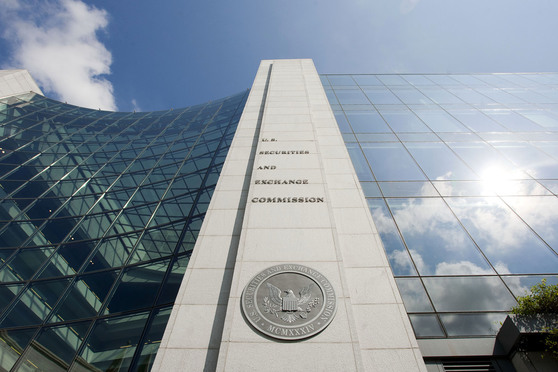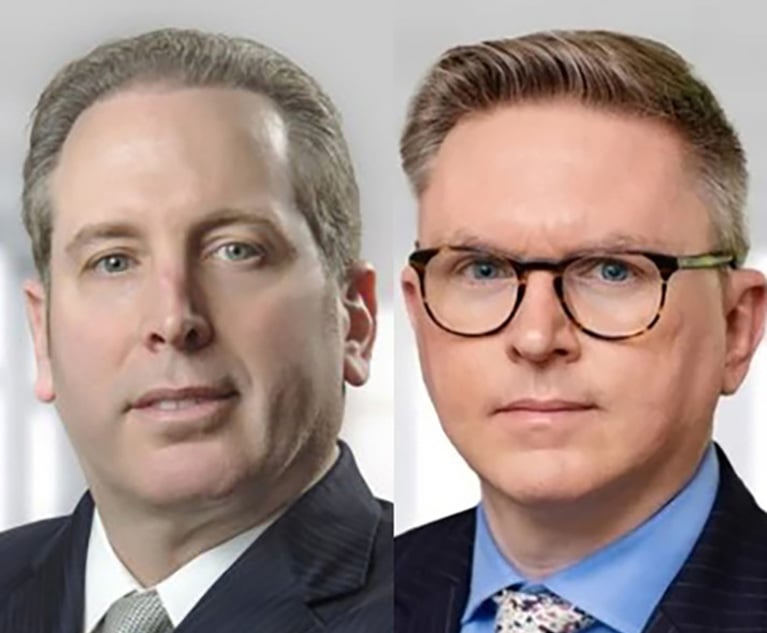Voya Financial Pays $1 Million to Settle SEC Charges for Deficient Cybersecurity
The U.S. Securities and Exchange Commission said the settlement announced Wednesday was the first connected with charges filed under the Safeguards Rule and the Identity Theft Red Flags Rule adopted by the SEC in 2013, which requires financial services companies to adopt policies and procedures to prevent data theft.
September 27, 2018 at 02:56 PM
5 minute read
 Headquarters of the U.S. Securities and Exchange Commission.
Headquarters of the U.S. Securities and Exchange Commission.
This story was updated at 6:00 pm Thursday E.D.T. Sept. 27 with comment from Voya Financial Advisors Inc.
Voya Financial Advisors Inc. has agreed to pay $1 million to the U.S. Securities and Exchange Commission to settle charges connected with an April 2016 cyber intrusion that compromised the personal information of more than 5,600 customers at the broker-dealer and investment adviser.
The SEC said the settlement announced Wednesday was the first connected with charges filed under the Safeguards Rule and the Identity Theft Red Flags Rule adopted by the SEC in 2013, which requires financial services companies to adopt policies and procedures to prevent data theft.
According to the SEC order, Voya failed “to adopt written policies and procedures reasonably designed to protect customer records and information” in violation of the Identity Theft Red Flags Rule.
The company, a Minnesota corporation based in Des Moines, Iowa, didn't admit or deny wrongdoing under the settlement. Voya Financial Advisors has more than 13 million customers and $11 billion in assets under management, according to the SEC documents.
“This case is a reminder to brokers and investment advisers that cybersecurity procedures must be reasonably designed to fit their specific business models,” said Robert A. Cohen, chief of the SEC Enforcement Division's cyber unit in a news release. “They also must review and update the procedures regularly to respond to changes in the risks they face.”
A company spokesman for Voya Financial Advisors said in an emailed statement Thursday afternoon: “We are pleased to have resolved this matter. After the intrusion, Voya promptly remediated and reported the incident and we notified the individuals who were involved. No personal information was taken electronically from our systems, and there was no evidence of financial harm. We have also enhanced our measures so that a similar situation does not reoccur.” The statement continued, “Voya takes fraud and security matters seriously, and we invest significantly each year in our programs to protect the accounts and personal information of customers. We also know that independent advisors and third parties who work with us are increasingly the targets of fraud. As part of our efforts, Voya continues to work with and support these partners to help protect their identity and client information.”
Joseph Facciponti, a shareholder at Murphy & McGonigle, who is a former federal prosecutor in the Cybercrimes Division of the U.S. Attorney's Office for the Southern District of New York, said in a statement: “When it comes to cybersecurity, the SEC has recently appeared more concerned with ensuring that public companies disclose material cyber risks and incidents and less concerned with policing whether financial services firms' cybersecurity programs were up to the task of protecting customer data from hackers. However, this enforcement action demonstrates that the SEC is still prepared to impose significant penalties where it believes that firms could have done more to protect themselves from cyberattacks.”
The SEC order stated that from at least 2013 through 2017 Voya gave its independent contractor representatives access to its brokerage customer and advisory client information through a web portal that contractor representatives used to access the personally identifiable information of customers and manage their accounts. The contractors used their own computers, IT equipment and networks to access the portals.
Over six days in April 2016, one or more persons impersonating VFA independent contractor representatives called the company's technical support line and requested resets of three representatives' passwords for the portal, in two cases using phone numbers that previously had been used in fraudulent activity, which also involved attempts to impersonate Voya contractors, the order said. They then used the information to create fake new online customer profiles that they used to obtain unauthorized access to account documents for three customers. The SEC said, however, there haven't been any known unauthorized transfer of funds or securities from customer accounts resulting from the intrusion.
According to the SEC order, VFA's registered representatives outnumber its 1,000 employees by almost 3.8 -1 at more than 1,200 locations in the United States providing brokerage and investment advisory services to customers whose account information containing personally identifiable information (PII) they regularly collect and access.
The SEC order stated Voya cybersecurity procedures were applicable to independent contractors including those working out of remote offices, but “were not reasonably designed to apply to the systems they used.”
Contractors' personal computers were supposed to be scanned for antivirus software, encryption and updates, for example, but they were scheduled for only three times a year and the representatives themselves often did not comply, the SEC order stated.
The SEC settlement required Voya to undertake remedial actions including hiring an independent compliance consultant.
This content has been archived. It is available through our partners, LexisNexis® and Bloomberg Law.
To view this content, please continue to their sites.
Not a Lexis Subscriber?
Subscribe Now
Not a Bloomberg Law Subscriber?
Subscribe Now
NOT FOR REPRINT
© 2025 ALM Global, LLC, All Rights Reserved. Request academic re-use from www.copyright.com. All other uses, submit a request to [email protected]. For more information visit Asset & Logo Licensing.
You Might Like
View All


Law Firms Expand Scope of Immigration Expertise Amid Blitz of Trump Orders
6 minute readTrending Stories
- 1Decision of the Day: Judge Sanctions Attorney for 'Frivolously' Claiming All Nine Personal Injury Categories in Motor Vehicle Case
- 2Second Judge Blocks Trump Federal Funding Freeze
- 3Crypto Hacker’s $65 Million Scam Ends in Indictment
- 4Trump's Inspectors General Purge Could Make Policy Changes Easier, Observers Say
- 5Supporting Our Supreme Court Justices in the Guardianship Part
Who Got The Work
J. Brugh Lower of Gibbons has entered an appearance for industrial equipment supplier Devco Corporation in a pending trademark infringement lawsuit. The suit, accusing the defendant of selling knock-off Graco products, was filed Dec. 18 in New Jersey District Court by Rivkin Radler on behalf of Graco Inc. and Graco Minnesota. The case, assigned to U.S. District Judge Zahid N. Quraishi, is 3:24-cv-11294, Graco Inc. et al v. Devco Corporation.
Who Got The Work
Rebecca Maller-Stein and Kent A. Yalowitz of Arnold & Porter Kaye Scholer have entered their appearances for Hanaco Venture Capital and its executives, Lior Prosor and David Frankel, in a pending securities lawsuit. The action, filed on Dec. 24 in New York Southern District Court by Zell, Aron & Co. on behalf of Goldeneye Advisors, accuses the defendants of negligently and fraudulently managing the plaintiff's $1 million investment. The case, assigned to U.S. District Judge Vernon S. Broderick, is 1:24-cv-09918, Goldeneye Advisors, LLC v. Hanaco Venture Capital, Ltd. et al.
Who Got The Work
Attorneys from A&O Shearman has stepped in as defense counsel for Toronto-Dominion Bank and other defendants in a pending securities class action. The suit, filed Dec. 11 in New York Southern District Court by Bleichmar Fonti & Auld, accuses the defendants of concealing the bank's 'pervasive' deficiencies in regards to its compliance with the Bank Secrecy Act and the quality of its anti-money laundering controls. The case, assigned to U.S. District Judge Arun Subramanian, is 1:24-cv-09445, Gonzalez v. The Toronto-Dominion Bank et al.
Who Got The Work
Crown Castle International, a Pennsylvania company providing shared communications infrastructure, has turned to Luke D. Wolf of Gordon Rees Scully Mansukhani to fend off a pending breach-of-contract lawsuit. The court action, filed Nov. 25 in Michigan Eastern District Court by Hooper Hathaway PC on behalf of The Town Residences LLC, accuses Crown Castle of failing to transfer approximately $30,000 in utility payments from T-Mobile in breach of a roof-top lease and assignment agreement. The case, assigned to U.S. District Judge Susan K. Declercq, is 2:24-cv-13131, The Town Residences LLC v. T-Mobile US, Inc. et al.
Who Got The Work
Wilfred P. Coronato and Daniel M. Schwartz of McCarter & English have stepped in as defense counsel to Electrolux Home Products Inc. in a pending product liability lawsuit. The court action, filed Nov. 26 in New York Eastern District Court by Poulos Lopiccolo PC and Nagel Rice LLP on behalf of David Stern, alleges that the defendant's refrigerators’ drawers and shelving repeatedly break and fall apart within months after purchase. The case, assigned to U.S. District Judge Joan M. Azrack, is 2:24-cv-08204, Stern v. Electrolux Home Products, Inc.
Featured Firms
Law Offices of Gary Martin Hays & Associates, P.C.
(470) 294-1674
Law Offices of Mark E. Salomone
(857) 444-6468
Smith & Hassler
(713) 739-1250







